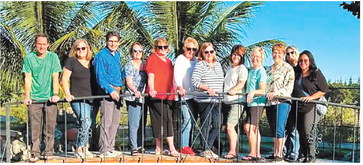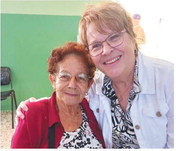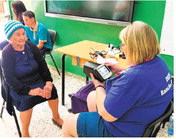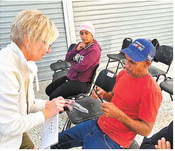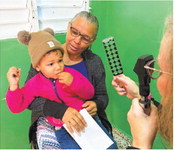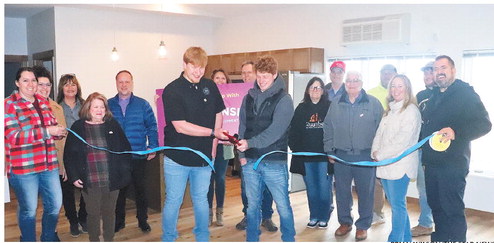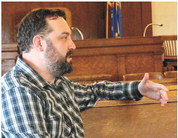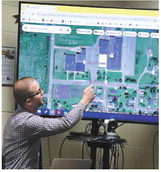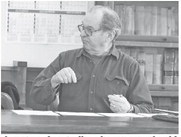Area women help give the gift of sight
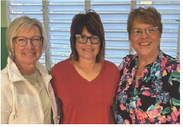

Three area women helped bring the gift of sight to residents of the Dominican Republic.
Betty Herrell and Diane Solberg of HealthView Eye Care Center in Medford and Colby took part in a mission trip with Volunteer Optometric Services to Humanity (VOSH) to the Dominican Republic January 9 to 18. This was Herrell’s fourth trip as part of the program and Solberg’s second. They were joined this year by fellow coworker Yvonne Budimlija on her first trip with VOSH.
This year even getting to their destination was an adventure. The travelers took a full day arriving at the airport in the capital and then took a bus for three hours to the isolated mountain community of Rancho Arriba, which is located in the province of San José de Ocoa and has a population of about 14,000 people, and arrived after dark.
The Dominican Republic is a Caribbean nation that shares the island of Hispaniola with Haiti. The official language of the nation of 12 million is Spanish with agriculture in the form of sugar, coffee and
See AREA WOMEN on page 8 tobacco a major industry. In recent years, the service sector and tourism have overtaken agriculture as the largest employer.
Poverty is endemic in the country with the median income of just $318 per month. A medical doctor in the Dominican Republic makes about $14,000 per year.
“It was a big eye opener just to see what it's like there and even more so when we took care of patients,” Budimlija said of the poverty in the region.
“Buildings are constructed with whatever they can kind of slap together,” Solberg said of the houses they passes along the way to the hotel they were staying at for the trip.
This was the second time a VOSH trip had come to Rancho Arriba, they had been there two years ago. This helped with the local mayor understanding what they were doing and able to bring with them. They set up their clinic in a local middle/ high school.
According to Herrell, the closest vision care for the community is in the capital of Santa Domingo located three hours down the mountainside. “Financially that is difficult for people,” she said.
As with any trip, this one was not without its hiccups. They were delayed in seeing patients as the paperwork allowing foreign medical providers to practice in the country had not been signed. There were also snags at the airport as bags carrying used glasses were flagged by customs.
“They wanted to charge us like a $1,000, because they were convinced that we were going to be selling these used eyeglasses and making money off of this and that it wasn't a volunteer mission,” Solberg said.
This is where having the support of the local mayor helped in talking with the customs officials. While they still ended up having to pay an additional $160 to get their bags of glasses out of customs, they were eventually able to do so and get set up to see patients.
“We had a lot of new people,” Herrell said. The group included the three from this area along with three optometrists and other support staff including a friend of one of the doctors who was a retired radiologist.
Even with the shortened window to actually see patients, the VOSH mission was busy, seeing 1,116 patients over the five days.
As patients came through the clinic, they would get prescriptions from the doctors and it would be up to Herrell, Solberg and Budimlija to go through the glasses they had brought with them to determine if there were ones close to the prescription.
All of the glasses were donated through the local Lions Clubs as part of their eyeglass drives. The women praised the Lions and the individuals who donated their used glasses, noting that programs like VOSH help put the glasses to good use rather than collecting dust in a drawer in people’s homes.
Herrell noted that with the country located in the tropics there is a significant need for sunglasses to protect eyes from sun damage. “We just can't get enough sunglasses for these people,” Herrell said.
One of the major challenges is with people with very strong prescriptions. They often didn’t have the exact prescription, but they would try to get something close recognizing that something was better than the lack of glasses they had before.
Herrell noted that every year she has gone, there has been a moment where she has thought “Okay, this is why I am here.” She said that she feels this way when the people with the extreme prescriptions come in and they have no glasses.
She described a woman who came in who was in her 80s. “She is this tiny woman and she starts speaking to me,” Herrell said. The primary language in the region is Spanish, which Herrell does not speak. She noted the old woman had only two fingers on one hand and three fingers on the other and was showing Herrell her hands. Herrell said that she got her prescription and saw that it was a negative four, describing it as someone who would not be able to see the large E on the standard vision charts.
They were able to get her in glasses and said the woman was in awe when she put them on and was able to see. Herrell said the woman walked out with the glasses on her face, which is a challenge in the Domincan Republic as many of the people save their glasses to protect them and not wear them out.
“They think they have to save them for special occasions so they will put them in their pocket or in their purses,” Solberg said.
Solberg said that there are always those with extreme or unusual prescriptions and there is not something in their fit in the donated glasses. In these situations, they take the people’s measurements and make glasses for them in the United States working in partnership with the labs used by HealthView. She said they get these glasses made up and ship them to members of the VOSH team who are in the Dominican Republic who then get them to the patients.
Solberg said that between all the people on the team, they brought back about 14 pairs of glasses to be made in the United States and shipped back.
In addition to working in the clinic, the volunteers got to experience some of the culture and see the region in which they were staying. Solberg noted that hotel amenities in the Dominican Republic are not the same as people in the United States are used to. She said they were kept up with a rooster crowing throughout the night and found that in the alley right outside their hotel room window there was a whole chicken coop that serenaded them through their stay there.
On the day before they were set to leave, they got a tour of a nearby community that was having festival showing off the local church and the central park area. They also took the group on a tour of a local hydroponics farm in Rancho Arriba and explained the community is working to improve and diversify its economy.
Solberg noted that the community is very progressive for the region with a progressive mayor who is working to clean up the community by improving drainage and repairing roads. “They are really trying to be more self-sustaining and not reliant on the coffee industry,” Solberg said.
Each year the VOSH trip goes to a different part of the country. Next year, they are going to be in an area just outside the capital in Santa Domingo. A member of the VOSH team who lives in the Dominican Republic sets up the places where they visit and the clinics.
